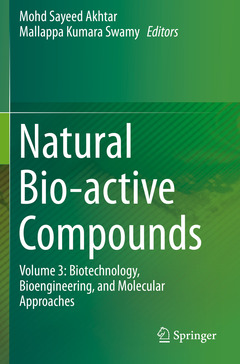Natural Bio-active Compounds, 1st ed. 2019 Volume 3: Biotechnology, Bioengineering, and Molecular Approaches
Coordonnateurs : Akhtar Mohd Sayeed, Swamy Mallappa Kumara

Natural bioactive compounds have become an integral part of plant-microbe interactions geared toward adaptation to environmental changes. They regulate symbiosis, induce seed germination, and manifest allelopathic effects, i.e., they inhibit the growth of competing plant species in their vicinity. In addition, the use of natural bioactive compounds and their products is considered to be suitable and safe in e.g. alternative medicine. Thus, there is an unprecedented need to meet the increasing demand for plant secondary metabolites in the flavor and fragrance, food, and pharmaceutical industries. However, it is difficult to obtain a constant quantity of compounds from the cultivated plants, as their yield fluctuates due to several factors including genotypic variations, the geography, edaphic conditions, harvesting and processing methods. Yet familiarity with these substances and the exploration of various approaches could open new avenues in their production.
This book describes the basis of bioactive plant compounds, their mechanisms and molecular actions with regard to various human diseases, and their applications in the drug, cosmetic and herbal industries. Accordingly, it offers a valuable resource for students, educators, researchers, and healthcare experts involved in agronomy, ecology, crop science, molecular biology, stress physiology, and natural products.
Chapter 1. Bioactive Peptides: Role in Plant Growth and Defense.- Chapter 2. Linking Omics Approaches to Medicinal Plants and Human Health.- Chapter 3. Application of Biotechnology in Producing Plant Bio-active Compounds.- Chapter 4. Transgenic plant cell cultures: A promising approach for secondary metabolites production.- Chapter 5. An Insight into Biotechnological Approaches Used for Improvement and Secondary Metabolites for Medicinal Aquatic Plant Water hyssop (Bacopa monnieri L.).- Chapter 6. Prospects for the Use of Plant cell culture as alternatives to produce secondary metabolites.- Chapter 7. Biotechnological exercises in the production of secondary metabolites and its significance in health care practices.- Chapter 8. Salient biotechnological interventions in saffron (Crocus sativus L.), a major source of bioactive apocarotenoids.- Chapter 9. Recent advances in extraction, characterization and potential use of Citral.- Chapter 10. Hairy root cultures as analternative source for the production of high-value secondary metabolites.- Chapter 11. Plant Cell Culture as Alternatives to Produce Secondary Metabolites.- Chapter 12. Metabolic Engineering Strategies for Enhancing the Production of Bioactive Compounds from Medicinal Plants.- Chapter 13. Enhancement of Rosmarinic Acid Content by Biotechnological Approaches and Metabolic Engineering.
Dr. Mohd Sayeed Akhtar (PhD) is an Assistant Professor at Gandhi Faiz-e-Aam College, Shahjahanpur, UP, India. He received his PhD degree from Aligarh Muslim University (AMU), India in 2008, prior to conducting post-doctoral research at the Botanical Institute, University of Basel (BIB), Switzerland (2008–2010), and at Chonbuk National University (CBNU), Republic of Korea in 2011. He was an Assistant Professor at Jimma University, Ethiopia (2011-2014), and a fellow researcher at the Institute of Tropical Agriculture, Universiti Putra Malaysia (UPM), (2014-2015). Dr. Akhtar has more than 15 years of research and 10 years of teaching experience in soil microbiology, applied microbiology, environmental microbiology, molecular biology, plant pathology and plant nanobiotechnology. He has authored or co-authored more than one hundred articles in peer-reviewed journals, conference proceedings, and book chapters, and has edited 10 books with international publishers. Further, he serves as an editorial board member and reviewer for several high-impact international journals. His current research is focused on rhizospheric plant-microbe interactions and molecular biotechnology, bioremediation, biomineralization, nano-fertilizers and nanobiotechnology.
Dr. Mallappa Kumara Swamy (PhD) is a Professor and Head of the Department of Biotechnology at East West College of Science, Bengaluru, Karnataka, India. He completed his postdoctoral research at the Department of Crop Science, Faculty of Agriculture, Universiti Putra Malaysia (UPM), Serdang, Selangor, Malaysia. Before that, he had worked as an Associate Professor and Head of the Department of Biotechnology, Padmashree Institute of Management and Sciences, Bangalore University, Bengaluru, India. He received his PhD (Biotechnology) from Acharya Nagarjuna University, Guntur, India in 2013. He has more than 15 years of teaching and research experience in the fields of plant biotechnology, secondary metabolitepr
Date de parution : 10-2020
Ouvrage de 330 p.
15.5x23.5 cm
Date de parution : 10-2019
Ouvrage de 330 p.
15.5x23.5 cm



